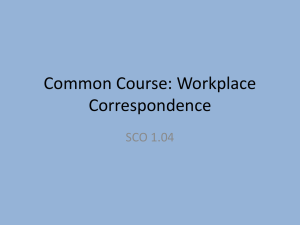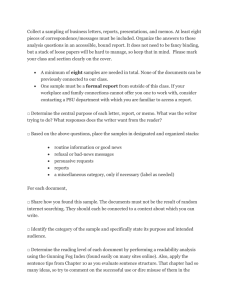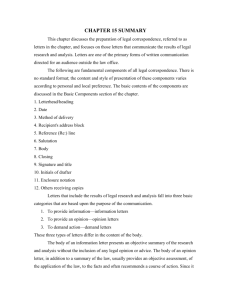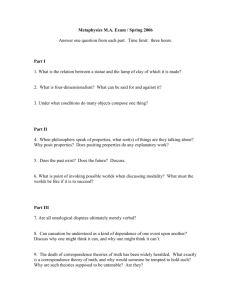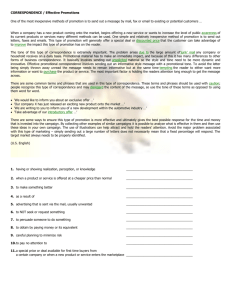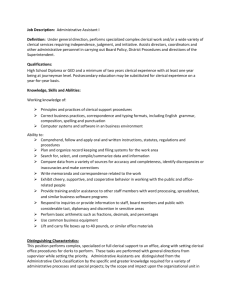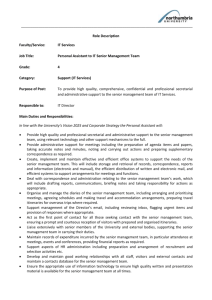CLUSTER Business and Marketing CONCENTRATION
advertisement
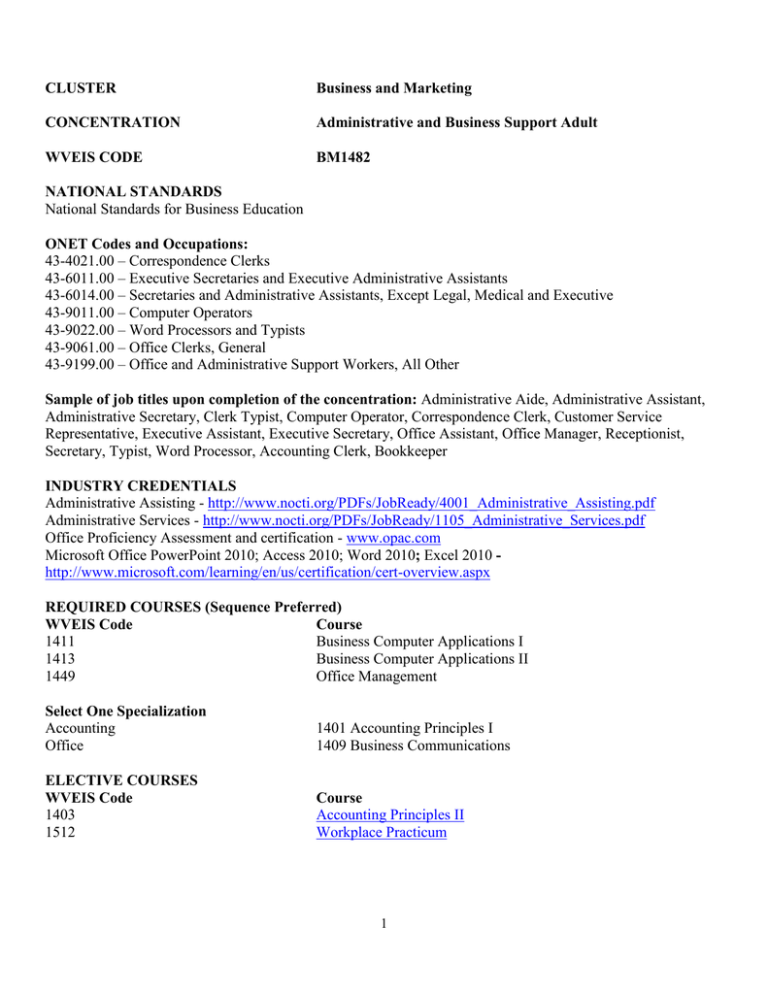
CLUSTER Business and Marketing CONCENTRATION Administrative and Business Support Adult WVEIS CODE BM1482 NATIONAL STANDARDS National Standards for Business Education ONET Codes and Occupations: 43-4021.00 – Correspondence Clerks 43-6011.00 – Executive Secretaries and Executive Administrative Assistants 43-6014.00 – Secretaries and Administrative Assistants, Except Legal, Medical and Executive 43-9011.00 – Computer Operators 43-9022.00 – Word Processors and Typists 43-9061.00 – Office Clerks, General 43-9199.00 – Office and Administrative Support Workers, All Other Sample of job titles upon completion of the concentration: Administrative Aide, Administrative Assistant, Administrative Secretary, Clerk Typist, Computer Operator, Correspondence Clerk, Customer Service Representative, Executive Assistant, Executive Secretary, Office Assistant, Office Manager, Receptionist, Secretary, Typist, Word Processor, Accounting Clerk, Bookkeeper INDUSTRY CREDENTIALS Administrative Assisting - http://www.nocti.org/PDFs/JobReady/4001_Administrative_Assisting.pdf Administrative Services - http://www.nocti.org/PDFs/JobReady/1105_Administrative_Services.pdf Office Proficiency Assessment and certification - www.opac.com Microsoft Office PowerPoint 2010; Access 2010; Word 2010; Excel 2010 http://www.microsoft.com/learning/en/us/certification/cert-overview.aspx REQUIRED COURSES (Sequence Preferred) WVEIS Code Course 1411 Business Computer Applications I 1413 Business Computer Applications II 1449 Office Management Select One Specialization Accounting Office 1401 Accounting Principles I 1409 Business Communications ELECTIVE COURSES WVEIS Code 1403 1512 Course Accounting Principles II Workplace Practicum 1 REQUIRED COURSE SKILL SETS Career Preparation Skills Safety Leadership Development Customer and Personal Service Clerical Applications Basic Computer Applications Administrative Tasks Computers and Electronics Administration and Management Office Tasks Accounting Principles Accounting Process Financial Reports Financial Analysis Compliance Reading Strategies Listening and Observations Skills Oral Communication Skills Written Communication Skills Social Communication Skills Career Communications 2 Skill set standards for Career Preparation Skills, Safety, Leadership Development and Customer and Personal Service should be integrated throughout the concentration as remaining skill sets are delivered. Skill Set Knowledge Objectives Career Preparation Skills Students will demonstrate knowledge of Performance Objectives career paths. goal development and achievement. attitudes and work habits that support career retention and advancement. communication in varied contexts. Students will Skill Set Knowledge Objectives relate skills and abilities to possible career pathways. explain methods of goal development. exhibit methods of time management and task coordination. practice professionalism in punctuality, appropriate dress, task completion, etc. investigate methods of supervision such as giving and receiving feedback and instruction. develop and present a statement of their personal work ethic beliefs. prepare an application, cover letter, resume and thank you letter. create a personal portfolio for use when applying for employment. practice simulated job interviews. Safety Students will demonstrate knowledge of Performance Objectives electrical equipment safety. basic computer equipment and hardware safety. work areas and furnishings setup. Students will Skill Set Knowledge Objectives demonstrate electrical safety procedures. perform basic computer equipment and hardware maintenance. set up effective work areas for surfaces and furnishings. Leadership Development Students will demonstrate knowledge of public speaking. parliamentary law. leadership concepts. characteristics of effective teams and organizations. 3 Performance Objectives Students will Skill Set Knowledge Objectives develop and deliver speeches. participate in meetings using parliamentary law procedures. attend leadership conferences or training (local, state or national). volunteer in community service opportunities. participate in career development events. Customer and Personal Service Students will demonstrate knowledge of Performance Objectives meeting quality standards for services. evaluating customer satisfaction. Students will communicate with customers, employees and other individuals to answer questions, disseminate or explain information, take orders and address complaints. access customer needs, meet quality standards for service and evaluate customer satisfaction. greet visitors or callers and handle their inquiries or direct them to the appropriate persons according to their needs. answer telephones and give information to callers, take messages or transfer calls to appropriate individuals. greet visitors and determine whether they should be given access to specific individuals. provide services to customers, such as order placement or account information. 4 Business Computer Applications I Skill Set Knowledge Objectives Clerical Applications Students will demonstrate knowledge of Performance Objectives WVEIS 1411 administrative and clerical procedures and systems. word processing. managing files and records. designing forms. other office procedures and terminology. Students will Skill Set Knowledge Objectives answer telephones and give information to callers, take messages or transfer calls to appropriate individuals. file and maintain records. compile, copy, sort and file records of office activities, business transactions and other activities. make copies of correspondence or other printed material. review work done by others to check for correct spelling and grammar, ensure that company format policies are followed and recommend revisions. compose, type and distribute meeting notices, routine correspondence and reports. gather, register and arrange the material to be typed, following instructions. review correspondence for format and typographical accuracy, assemble the information into a prescribed form with the correct number of copies and submit it to an authorized official for signature. Basic Computer Applications Students will demonstrate knowledge of Performance Objectives electronic equipment. computer hardware and software, including applications. Students will differentiate amongst hardware, software, system software and application software. suggest and check alternate spellings, locations and/or listing formats for customers lacking details or complete information. operate office equipment such as fax machines, copiers and phone systems, and use computers for spreadsheet, word processing, database management and other applications. compile, sort and verify the accuracy of data before it is entered. compare data with source documents or re-enter data in verification format to detect errors. store completed documents in appropriate locations. format documents, insert graphics, create tables, sort data and use templates. 5 transmit information or documents to customers, using computer, mail or facsimile machine. maintain and update filing, inventory, mailing and database systems, either manually or using a computer. notify supervisor or computer maintenance technicians of equipment malfunctions. locate and attach appropriate files to incoming correspondence requiring replies. add new material to file records or create new records as necessary. find and retrieve information from files in response to requests from authorized users. type correspondence, reports, text and other written material from rough drafts, corrected copies, voice recordings, dictation or previous versions, using a computer or word processor. perform basic presentation functions to create, format, edit, save and print a presentation. operate spreadsheet, database programs and other types of software to load and manipulate data and to produce reports. operate new office technologies as they are developed and implemented. demonstrate netiquette, acceptable use policy and ethical practices related to Internet access. integrate Internet information into software applications. retrieve, separate and sort program output as needed and send data to specified users. type acknowledgement letters to persons sending correspondence. 6 Business Computer Applications II Skill Set Knowledge Objectives Administrative Tasks Students will demonstrate knowledge of Performance Objectives WVEIS 1413 administrative and clerical procedures and systems. word processing. managing files and records. designing forms. other office procedures and terminology. Students will operate telephone switchboard to answer, screen or forward calls, providing information, taking messages or scheduling appointments. greet visitors or callers and handle their inquiries or direct them to the appropriate person according to their needs. answer questions about records or files. perform administrative support tasks, such as proofreading, transcribing handwritten information, or operating calculators or computers to work with pay records, invoices, balance sheets or other documents. communicate with customers, employees and other individuals to answer questions, disseminate or explain information, take orders and address complaints. complete forms in accordance with company procedures. compute, record and proofread data and other information, such as records or reports. conduct research, compile data and prepare papers for consideration and preparation by executives, committees and boards of directors. read and analyze incoming memos, submissions and reports to determine their significance and plan their distribution. perform general office duties, such as ordering supplies, maintaining records management database systems and performing basic bookkeeping work. collect and disburse funds from cash accounts and keep records of collections and disbursements. compile, transcribe and distribute minutes of meetings. process and prepare documents, such as business or government forms and expense reports. analyze data to determine answers to questions from customers or members of the public. 7 Skill Set Knowledge Objectives Computers and Electronics Students will demonstrate knowledge of Performance Objectives electronic equipment. computer hardware and software, including applications. Students will read source documents such as canceled checks, sales reports or bills and enter data in specific data fields or onto tapes or disks for subsequent entry, using keyboards or scanner. prepare invoices, reports, memos, letters, financial statements and other documents, using word processing, spreadsheet, database or presentation software. employ spreadsheet features such as advanced formatting, sorting, filtering and mathematical and logical operations. update records, design queries, generate reports and work with forms using database software. access, navigate and use on-line services. employ advanced word processing features to format documents, insert graphics, create tables, sort data, use templates, create watermarks, create macros, etc. transfer text, images and data between integrated software programs. create advanced word processing documents such as reports, mail merge, wizards, newsletters, etc. enter commands, using computer terminal and activate controls on computer and peripheral equipment to integrate and operate equipment. prepare documents and correspondence such as damage claims, credit and billing inquiries, invoices and service complaints. monitor the system for equipment failure or errors in performance. respond to program error messages by finding and correcting problems or terminating the program. compile data from records to prepare periodic reports. keep records of materials filed or removed, using logbooks or computers. set up and maintain paper and electronic filing systems for records, correspondence and other material. record information such as computer operating time, problems that occurred and actions taken. file and store completed documents on computer hard drive or an external storage device and/or maintain a computer filing system to store, retrieve, update and delete documents. 8 Office Management WVEIS 1449 Skill Set Knowledge Objectives Administration and Management Students will demonstrate knowledge of Performance Objectives human resources modeling. leadership techniques. production methods. coordination of peoples and resources. Students will resolve customer complaints or answer customers' questions regarding policies and procedures. supervise the work of office, administrative or customer service employees to ensure adherence to quality standards, deadlines and proper procedures, correcting errors or problems. develop work schedules according to budgets and workloads. provide employees with guidance in handling difficult or complex problems or in resolving escalated complaints or disputes. implement corporate or departmental policies, procedures and service standards in conjunction with management. complete forms in accordance with company procedures. discuss job performance problems with employees to identify causes and issues and to work on resolving problems. train or instruct employees in job duties or company policies or arrange for training to be provided. conduct research, compile data and prepare papers for consideration and presentation by executives, committees and boards of directors. evaluate employees' job performance and conformance to regulations and recommend appropriate personnel action. review records or reports pertaining to activities such as production, payroll or shipping to verify details, monitor work activities or evaluate performance. recruit, interview and select employees. interpret and communicate work procedures and company policies to staff. prepare and issue work schedules, deadlines and duty assignments for office or administrative staff. read and analyze incoming memos, submissions and reports to determine their significance and plan their distribution. manage projects or contribute to committee or team work. coordinate activities with other supervisory personnel or with other work units or departments. plan, administer and control budgets for contracts, equipment and supplies. process payroll information. coordinate conferences and meetings. supervise and train other clerical staff and arrange for employee training by scheduling training or organizing training material. 9 Skill Set Knowledge Objectives coordinate and direct office services, such as records, departmental finances, budget preparation, personnel issues and housekeeping to aid executives. make recommendations to management concerning such issues as staffing decisions or procedural changes. set up and oversee administrative policies and procedures for offices or organizations. monitor and direct the work of lower-level clerks. Office Tasks Students will demonstrate knowledge of Performance Objectives administrative and clerical procedures and systems. word processing. managing files and records. designing forms. other office procedures and terminology. Students will operate office equipment such as fax machines, copiers and phone systems, and use computers for spreadsheet, word processing, database management and other applications. transmit information or documents to customers, using computer, mail or facsimile machine. maintain and update filing, inventory, mailing and database systems, either manually or using a computer. prepare invoices, reports, memos, letters, financial statements and other documents, using word processing, spreadsheet, database or presentation software. set up and maintain paper and electronic filing systems for records, correspondence and other material. locate and attach appropriate files to incoming correspondence requiring replies. open, sort and route incoming mail, answer correspondence and prepare outgoing mail. compile, copy, sort and file records of office activities, business transactions and other activities. make copies of correspondence or other printed material. add new material to file records or create new records as necessary. track materials removed from files to ensure that borrowed files are returned. sort or classify information according to guidelines, such as content, purpose, user criteria, or chronological, alphabetical or numerical order. review work done by others to check for correct spelling and grammar, ensure that company format policies are followed and recommend revisions. compose, type and distribute meeting notes, routine correspondence and reports. compute, record and proofread data and other information, such as records or reports. 10 learn to operate new office technologies as they are developed and implemented. type, format, proofread and edit correspondence and other documents from notes or dictating machines, using computers or typewriters. read and analyze incoming memos, submissions and reports to determine their significance and plan their distribution. attend meetings to record minutes. manage and maintain executives' schedules. collect, count and disburse money, do basic bookkeeping and complete banking transactions. complete and mail bills, contracts, policies, invoices or checks. collect and disburse funds from cash accounts and keep records of collections and disbursements. process and prepare documents, such as business or government forms and expense reports. prepare and mail checks. 11 Accounting Principles I Skill Set Knowledge Objectives WVEIS 1401 Accounting Principles Students will demonstrate knowledge of Performance Objectives generally accepted accounting principles (GAAP). application and impact of GAAP on the recordkeeping of financial transactions. preparation of financial statements. Students will Skill Set Knowledge Objectives describe and explain the conceptual framework of accounting and generally accepted accounting principles and assumptions. define assets, liabilities, equity, revenue, expenses gains and losses. explain the accounting methods used to determine the value of accounts receivable to be reported on the balance sheet and describe the effect on the income statement. determine the cost of inventory for merchandising. record transactions for accounts payable and other short-term debt. record equity-related transactions. describe the criteria used to determine revenue recognition. record revenue-related transactions. describe the criteria used to determine expense recognition. record expense-related transactions. identify and apply appropriate information technology to the accounting system. describe how accounting information facilitates management decision-making. Accounting Process Students will demonstrate knowledge of Performance Objectives steps in the accounting cycle. preparing financial statements. Students will describe the purpose of the accounting system. describe the purpose of journals and ledgers and their relationship. describe the impact of technology on the accounting process. identify and explain the advantages and disadvantages of different types of accounting systems. differentiate between accounting and bookkeeping. analyze and describe how business transactions impact the accounting equation. apply the double-entry system of accounting to record business transactions and prepare a trial balance. explain the need for adjusting entries and record adjusting entries. explain the purposes of the closing process and record closing entries. 12 Skill Set Knowledge Objectives prepare the financial statements for the different types of business operations and ownership structures. describe the relationship between the closing process, the financial statements and the post-closing trial balance. Financial Reports Students will demonstrate knowledge of Performance Objectives annual reports. financial statements. Students will identify sources for obtaining financial reports. describe the users and uses of financial information. explain the role of management and the auditor in preparing and issuing an annual report. explain the role of accounting and regulatory organizations in relation to financial reports. describe the information provided in each financial statement and how the statements articulate with each other. describe the relationship between assets, liabilities and equity on the balance sheet. identify and explain the classifications within assets, liabilities and equity. identify the different formats of an income statement. identify the classifications in an income statement and explain their relationship to each other (revenue, expenses, gains, losses). describe changes in the ownership structure using the statement of equity. explain how and why the conceptual framework of accounting and generally accepted accounting principles provide guidance and structure for preparing financial statements. describe the different forms of business ownership and the advantages and disadvantages of each form. explain how the different forms of business ownership are reported in the financial statements. identify the different types of business operations. explain how the different types of business operations are reflected in the financial statements. 13 Skill Set Knowledge Objectives Financial Analysis Students will demonstrate knowledge of Performance Objectives financial conditions and operating results of a company. financial statements and information needed to make informed business decisions. Students will Skill Set Knowledge Objectives discuss the information that can be obtained from analyzing financial statements. assess profitability by calculating and interpreting financial ratios. apply information technology to conduct financial analysis. identify and explain common methods for creating financial statements and financial ratios. describe the ethical and legal implications resulting from others’ manipulation of financial statements and financial ratios. analyze cash flow from operating activities to assess profitability and liquidity. Compliance Students will demonstrate knowledge of Performance Objectives individual income tax procedures. tax laws and regulations. Students will describe the process by which tax laws are created. describe the composition of taxable income and calculate income tax. complete the applicable individual income tax forms. identify, discuss and apply strategies for minimizing taxable income. distinguish between tax avoidance and tax evasion. explain why income for financial reporting and taxable income are calculated differently. calculate net pay. calculate employer’s payroll taxes. prepare payroll reports. 14 Business Communications WVEIS 1409 Skill Set Knowledge Objectives Reading Strategies Students will demonstrate knowledge of Performance Objectives reading strategies to acquire meaning. Students will Skill Set Knowledge Objectives Performance Objectives determine whether written material and electronic media provides factual information or opinion. exhibit integrity in printed or oral communications. interpret relevant information from written materials. collect information from business correspondence, professional articles, electronic sources and supporting graphic material. follow written directions to achieve tasks. select an appropriate reading method for a particular situation. (e.g., skimming, scanning, speed reading or in-depth reading) determine the intent of printed propaganda and its impact on decision-making. Listening and Observation Skills Students will demonstrate knowledge of active listening and observation skills. verbal and nonverbal cues. Students will Skill Set Knowledge Objectives explain differences between hearing and listening. explain the advantages for effective listening techniques. implement effective listening techniques to assess and respond to major points of a speaker’s message. utilize information from multiple speakers within a group to obtain key facts and respond in an effective manner. determine methods to overcome major barriers to effective listening. collect, interpret and respond to different types of nonverbal messages and cues appropriately in various situations, including other cultures. demonstrate the ability to follow oral instructions in completing jobs. Oral Communication Skills Students will demonstrate knowledge of verbal skills to obtain and convey information. 15 Performance Objectives Students will Skill Set Knowledge Objectives establish the nature of effective verbal communications. construct relevant questions to elicit information in the exchange of ideas in a formal/informal setting. provide responses to inquiries. determine different types of nonverbal cues and discuss their impact on the communication process. develop thoughts in an organized manner to reflect logical thinking. use proper telephone techniques and etiquette to gather and record oral information. participate in group discussions. prepare effective oral presentations using tasks and techniques associated with special presentation situations. demonstrate an awareness and acceptance of international, regional and multicultural speech. Written Communication Skills Students will demonstrate knowledge of Performance Objectives written correspondence to convey and obtain information. Students will Skill Set Knowledge Objectives determine the nature of effective written communication. select and utilize appropriate formats for professional writing. edit written work to be consistent with professional standards. use acceptable steps in the writing process. identify factors affecting the readability for specific audiences. prepare professional e-mails, business letters, informational messages, inquiries, persuasive messages, executive summaries, proposals and simple and complex written reports that are grammatically correct and use appropriate business style. use a variety of references, resources and graphics for the purpose of writing business documents. develop effective electronic-based messages. (e.g. wiki, podcasting, blogs, etc) Social Communication Skills Students will demonstrate knowledge of Performance Objectives basic social communication skills. Students will determine personal self-concept and design a program for improvement. relate the role that self-concept plays in one’s personal and professional life. select appropriate business attire and demonstrate good grooming and personal hygiene. display a positive attitude in personal and professional settings. display an appropriate work ethic. 16 Skill Set Knowledge Objectives set communication goals and demonstrate flexibility in adjusting those goals in response to feedback from others or changes in the business environment. apply team skills in a business environment. apply the principles of group dynamics in structured activities. respect the customer-client confidentiality. demonstrate appropriate responses to passive, assertive and aggressive behavior. select appropriate communication techniques to avoid, minimize or prevent conflicts. Career Communications Students will demonstrate knowledge of Performance Objectives forms of communication in the successful pursuit of a career. Students will complete a career and job analysis. compose formal letters of application. create an appropriate resume. complete application forms. compose follow-up letters for job opportunities. participate in mock interviews in various situations. demonstrate appropriate dress in an interview situation. discuss the significance of nonverbal communications in the interviewing process. list qualities that employers expect in potential employees. use correct strategies for accepting or rejecting an employment offer. 17
